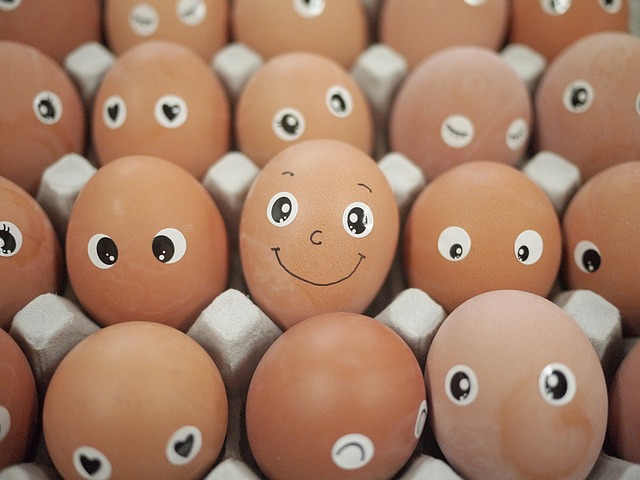Egg In Your Eyes – Difficult French Voyelles Posted by John Bauer on Oct 17, 2018 in Grammar, Vocabulary
Confusing simple things in a new language is so common it can be more surprising when it doesn’t happen than when it does. While mixing up the meaning of un mot (a word) happens all the time, when le mot has a sound that doesn’t exist en anglais it leads to different kinds of mistakes.
I often learn the hard way that I don’t know how to say un mot, but sometimes I’m already aware that I need help understanding what something means or how to say something.
When that happens, I try to ask un francophone (a French speaker) to explain what’s confusing me. That usually leads to everything becoming much clearer, but can also lead to strange conversations as I try to talk about a subject I’m not capable of talking about.
Par exemple (for example), there are 4 words that I mix up all the time:
Un œil – An eye
Un œuf – An egg
Les yeux – The eyes
Les œufs – The eggs
Les mots clearly mean different things. The problem comes from a sound that is particularly difficult for les anglophones (English speakers). Namely, les voyelles (the vowels) in all 4 words do not exist in English!
“œi”, “œu” (/œ/ en API*) et “eu”, “œu” (/ø/ en API)
“œi”, “œu” (/œ/ in IPA*) and “eu”, “œu” (/ø/ IPA)
*API signifie Alphabet Phonétique International (IPA stands for International Phonetic alphabet)
Ces voyelles are featured a lot in those 4 words and led to me asking mon ami (my friend) for help on how to pronounce them:
Tu sais, j’ai toujours du mal à distinguer les œufs et les yeux.
Comment ça ?
La prononciation est assez similaire.
Ah… Je me demandais comment une personne ne pourrait pas comprendre la différence entre un œuf et un œil.
Ouais, mais justement je voulais te poser une question à propos de la prononciation de ces mots.You know, I’ve always had trouble distinguishing eggs and eyes.
How’s that?
The pronunciation is pretty similar.
Ah… I was wondering how a person could not understand the difference between an egg and an eye.
Yeah, but I actually wanted to ask you a question about the pronunciation of these words.
It took a bit of time to get to asking about la prononciation, but that’s an important part of the learning process. After a few more questions we finally got to la question I originally wanted to ask:
Tu peux dire « les œufs » et puis « les yeux » ?
Ah ! Tu as du mal avec les voyelles !
Oui c’est ça !
C’est simple ! Les yeux et les œufs !Can you say “the eggs” and then “the eyes”?
Ah, you have trouble with the vowels!
Yes that’s it!
It’s simple! The ggs and the eyes!
Mon ami instantly knew what I was really asking when he heard mon accent (my accent) and how badly I pronounced the two words. They may have had trouble understanding the struggle of les anglophones, but they did help me hear the difference and figure out a trick to never mix my eggs and eyes.
For les yeux, I listen for a key sound to ensure I am hearing and saying it correctly:
“zy”
Since le mot is plural and almost always preceded by an article or pronoun that ends in s, la liaison gives it a distinctive “z” sound quickly followed by a “y” sound.
Un œuf always has an “f” sound after la voyelle and un œil always has a “y” sound after la voyelle.
Les œufs is the hardest one for me to get right because la prononciation can change depending on the speaker. Normally it is pronounced like les yeux, but without the “y” sound, but if is preceded by a consonant other than “z” it can change and sound exactly life un œuf. Cependant (however), after finding tricks for all the others, I remember that it’s the odd one out.
Here’s la prononciatin of all 4 words in IPA as well:
œil – \œj\
œuf – \œf\
yeux – \jø\
œufs – \ø\ or \œf\
Heureusement (luckily), usually les yeux et les œufs are never talked about at the same time!

Build vocabulary, practice pronunciation, and more with Transparent Language Online. Available anytime, anywhere, on any device.




